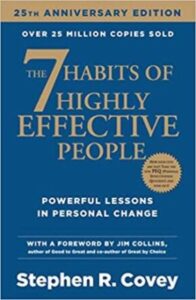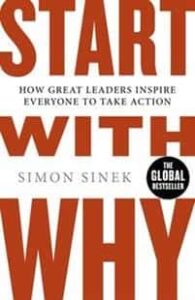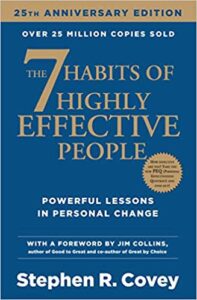Introduction
In modern life people tend to focus much more on the outside such as appearance and external things. The result of this is that once outward success isachieved they are still not happy with their lives. The reason for this because they haven’t developed an healthy internal state and characteristics. The author believes that the way we see the world is entirely based on our perceptions. So in order to change our feelings we must first change ourselves.
This book explains the seven habits that a lot of successful people have in common. These habits will teach you how to build a better character and also help you solve personal and professional problems more effectively.
Habit 1 – Be Proactive
Being proactive is all about taking responsibility of you life. Focusing on the things that you control and not let things outside of your control affect you. It is also important to take full responsibility of you behaviour and not blame it on external factors. A proactive person knows that the result and feelings he has is the result of his previous choices.
While many external factors can cause both physical and mental pain what we do have control over is how we respond to these events. A proactive person will for example ask them selves “what can I do to affect this situation” and then focus all their efforts towards that. Proactive people also don’t complain about things outside of their control because they realise it doesn’t help them in anyway.
Example of things we can control: attitude, habits and what things we want to learn.
Example of things we can’t control: weather, economy and other peoples opinions.
The opposite to a proactive person is a reactive person. This is a person who complains a lot about things outside of their control and doesn’t take responsibility of their lives. As a result of the lack of responsibility, reactive people also blame other people for their failures. They also don’t want to change since they don’t take responsibility for their behaviour and most likely have very low self awareness. Here are a couple famous reactive sayings: “There’s nothing I can do”, “That’s just the way I am”, “If only that had happened”.
Let’s say that a person fails an exam. A proactive person would ask himself “how can I improve?” and study harder for the next time while a reactive person would blame the teacher for not preparing him well enough.
Habit 2 – Begin With the End in Mind
The exercise to do here is to imagine yourself at your funeral and then ask yourself “what do I wanna be remembered for?”, “how did I live my life?”, “how was my relationships?”. By doing this exercise it can help you find your key values and what you wanna achieve in life.
You know have a plan for your life and each day of our lives should contribute to this vision. If we don’t have a plan, chances are we might be working on the wrong thing and only realise it very late in life.
Each action we take is done twice. The first time is when we imagine doing it and the second time is when we do it in real life. The key lesson here is that in order to have a higher chance at success, first visualise the desired outcome and the actions that needs to be taken first instead of going in without a plan. This can be done for both small and large projects.
Habit 3 – Put First Things First
This is all about prioritisation and focusing on what is important. To know what to put you time and effort into, the diagram below can help.
| Important | Not important | |
| Urgent | Quadrant 1 Activities: deadlines, crises… | Quadrant 2 Activities: planning, learning and growing, creating worthy relationships, health… |
| Not urgent | Quadrant 3 Activities: meetings, email, small interruptions… | Quadrant 4 Activities: time wasters, tv, social media… |
The activities we should focus most of our time on and always put first are the ones in quadrant 2. These are the things that will give as results and move us forward towards our long term goals. This means that we must be able to say “no” to a lot of things that are not related toquadrant 2. Quadrant 1 should of course be dealt with when they arrive but we should try our best to avoid these activities by, for example, planning ahead and looking for its root cause. For a lot of people there is a big difference between what they know they need to do and what they actually do.
Habit 4 – Think Win-Win
This is basically a rule we should have for ourselves when negotiating. The goal of anynegotiation should be that both people leave feeling happy and content with the outcome, it should be mutually beneficial. The mindset to have is to see life as cooperative and not a competition. If two peoplecannot reach win-win, the default should then be no deal.
The reason we should always look for win-win situations is because it helps to build longterm relationships. People are also happier and feel better in general when everyone involved leaves satisfied.
Most people operate as though everything is a zero-sum game, meaning if you get it, I don’t. People with this mindset have a hard time sharing credit with other people and it can be difficult for them to be happy when other people succeed.
Habit 5 – Seek First to Understand, Then to Be Understood
Most people don’t listen with the intent to understand but with the intent to reply. People normally don’t trust someone who they don’t feel really understands them or the situation because it can feel like they are being manipulated.
The solution is to become a more empathic listener by putting yourself in their situation and seeing things from their point of view. So the goal is to start listening with the intent to understand and after that answer with a well thought out reply. The time to be understood is when the opposite side asks for your opinion or advice.
Habit 6 – Synergize
This is all about people working together and understanding that the whole is greater than the sum of its parts. Meaning when two people are working together and it comes to output and producing results, 1 + 1 does not have to equal 2, but can instead be 3 or more. Each person has their own strengths andopinons which will lead to new insights which each person would not have come up with on their own.
The way to reach synergy between people is to create an environment in which everyone feels safe and respected. This requires usage of habit 4, think win-win and habit 5, seek first to understand, then be understood. It requires that each person shows honesty, openness and trust towards each other. Synergy can’t be achieved with everyone but you should always be looking for opportunities to create synergy if possible.
Habit 7 – Sharpen the Saw
The last habit is all about self-improvement, self-education and growth. You may be good enough right now but if you don’t sharpen yourself you will eventually become less effective. Putting time into learning new things and improving yourself is the best investment you can make. As we renew and take care of ourselves, this allows us to continue practice what is important to us in an effective way.
There are four areas in our life that can be sharpened and these are physical,mental, social and spiritual.
Physical: exercising, resting, a healthy diet and stress management.
Mental: reading, writing, learning and planning.
Social: improve and maintain relationships, develop both professional and personalrelationships, family and friends.
Spiritual: meditation, spend time in nature, music and art.





